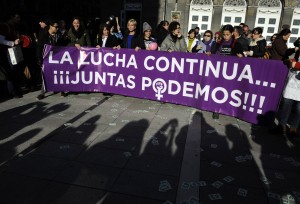By Emma Pinedo and Sonya Dowsett
MADRID (Reuters) – Spain’s center-right government moved to make it harder for women to get an abortion on Friday, restricting a law that had allowed the procedure on request within
request within  a 14 week term, in a bid to rally core conservative support. The proposed new rules will make Spain one of the most restrictive European countries on abortion and goes against the regional trend of greater ease of access, after Ireland legalized abortion under limited circumstances this year.
a 14 week term, in a bid to rally core conservative support. The proposed new rules will make Spain one of the most restrictive European countries on abortion and goes against the regional trend of greater ease of access, after Ireland legalized abortion under limited circumstances this year.
The draft law allows abortion only in the case of rape or if the pregnancy poses a serious physical or mental health risk to the mother. It eliminates the option of abortion on request in the case of malformation of the fetus.
In this case women would also have to argue that the pregnancy poses a physical or mental health risk.
The ruling People’s Party (PP) has an absolute majority in parliament, where the bill is expected to pass easily.
The majority of European countries offer abortion on request, according to the World Health Organization (WHO), with 88 percent allowing the termination of pregnancies if the fetus is thought to be impaired or in cases of rape or incest.
Abortion is illegal on any grounds in Malta and Andorra and severely limited in Poland.
The PP made reforming the abortion law an electoral promise in its 2011 campaign, and Justice Minister Alberto Ruiz-Gallardon is one of the more right-wing ministers who has often sided with the Catholic Church.
“We can’t allow the life of the unborn baby to depend exclusively on the decision of the mother,” Ruiz-Gallardon told reporters on Friday.
But pro-abortion activists and abortion clinics voiced dismay at what they saw as a retrogade step.
“This is the worst possible option we had considered,” said Francisca Garcia, head of abortion clinic association ACAI. “It places Spain among the most restrictive countries (in Europe).”
SUPPORTERS ALIENATED
Traditional PP voters have been alienated by tax hikes to plug a budget deficit, the release of Basque separatist prisoners under European human rights law and increased fervor for independence from Spain by the region of Catalonia.
Support for the PP has plunged since it won a landslide victory in 2011 elections, as the government cuts spending on education and health to battle a debt crisis, although it still maintains a lead over the Socialist opposition.
The move to restrict abortion will appeal to core PP supporters at a time when the government cannot carry out economic policies such as lowering taxes, as a result of its struggle to hit strict budget targets imposed by Brussels.
“It’s the minimum a center-right party can do to maintain its sense of identity, because otherwise it would be purely a technocratic party focused on resolving the economic crisis,” said Juan Carlos Rodriguez, an analyst with ASP Research Centre, an independent social sciences institute.
The government has recently implemented other socially conservative policies such as toughening penalties for unauthorized street protests and increasing powers of private security guards, allowing them to make arrests.
The former Socialist government changed the abortion law in 2010, allowing women to terminate unwanted pregnancies on demand within 14 weeks, or up to 22 weeks in cases of severe abnormalities, putting Spain in line with most of western Europe.
Abortion was first decriminalized in Spain in 1985 in the cases of a malformed fetuses, rape or potential mental or physical damage to the mother.
Spain’s leading opposition Socialist party has said it will fight the new law.
(Additional reporting by Tracy Rucinski; Editing by Fiona Ortiz and Mike Collett-White)














Follow Us